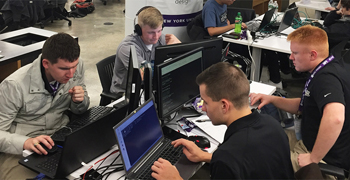Cadet Competitive Cyber Team finishes in Top 10 at competition

This article previously appeared here.
Four members of the Cadet Competitive Cyber Team (C3T) spent 36 straight hours over Veterans Day Weekend hacking into New York University, Tandon School of Engineering computers. These actions were fully endorsed by NYU and part of the Cyber Security Awareness Week (CSAW) North American Capture the Flag (CTF) Championship.
This annual event features teams from the top computer science schools in the nation. West Point’s team advanced to the championship round for the sixth straight year, and finished in ninth place—the highest finish ever for the team known in hacking competitions as BitsForEveryone (BFE).
Represented by just four cadets at the championship, the achievement was an accomplishment for the entire team of 20 cadets (plus one midshipmen and a local high school student). During the qualifying competition in September, BFE locked themselves in Thayer Hall and hacked away in the online competition for 48 consecutive hours.
Solving problems in the categories of reverse engineering, binary exploitation, cryptography, web security and forensics, they finished 46th out of 1,274 teams around the world. The team finished 14th in undergraduate North American teams and high enough to advance to the final live event hosted in Brooklyn in November.
Class of 2018 Cadet Connor Eckert had never participated in a team CTF event before the qualifiers. He says the stress and long hours add to the enjoyment of the competition.
“Hacking really gets fun once the lack of sleep hits you and everything becomes hilarious,” Eckert said.
Team captain Class of 2017 Cadet Chris Maixner, one of the team members to compete in finals, attributes the success of the team to the dedicated time for training.
“Every minute of practice is critical to our success. Our time together is also our most limiting factor, so we train rigorously in order to fight and win against our rivals,” Maixner said.
Class of 2017 Cadet Gun Woo Kim attributes success in CTF events as a combination of individual skills and synchronized teamwork. “It was a great team-building experience and we really bonded as a team after our success in the qualification round.”
He additionally recognizes having two thirds of the team being new this year as a strength. “At first, I was worried that the new guys did not have enough experience, but having extra pairs of fresh eyes looking at the challenges helped us a lot.”
The team sharpened their skills during many activities over the past year to improve their offensive and defensive cyber abilities. They held weekend workshops led by cyber security experts from across the security field.
They have also augmented their traditional classroom education with attendance at conferences, training events and internships with the organizations from across government, academia, and industry. Recently, cadets and coaches participated in an individual Army-wide CTF competition where many finished at the top of their respective categories.
It’s a fine line between the love of computer security and the thrill of taking over a target computer that motivates and inspires the C3T cadets to give up their free time to improve their understanding of cyber warfare.
The C3T set two goals: finishing in the Top 5 of the CSAW Finals, and getting invited to DEFCON CTF, considered as the “Super Bowl” of hacking. With the continual improvement seen year over year, someday West Point uniforms may be seen intermixed with the spiked blue hair, facial piercings and black T-shirts worn by your stereotypical hacker.